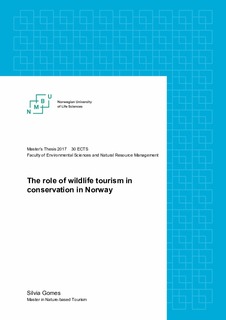The role of wildlife tourism in conservation in Norway
Master thesis
Permanent lenke
http://hdl.handle.net/11250/2497994Utgivelsesdato
2017Metadata
Vis full innførselSamlinger
- Master’s theses (MINA) [668]
Sammendrag
Nature-based tourism is a growing tendency in Norway and in the rest of the world. One of the sectors that seem to grow most rapidly is wildlife watching. Based on existing
data from quantitative and qualitative research on nature-based tourism in Norway and worldwide, this study aims to analyze the role of wildlife tourism relying on non-captive/non-consumptive wildlife in Norway and its relation to conservation. The objective of this thesis is to investigate and contribute to an understanding of which role wildlife tourism plays in conservation (here translated to preservation of the species in its natural environment), how and whether it promotes it. To answer this questions, a questionnaire to a semi-structured interview was developed and four sub-questions were defined, which included getting an overview of the actions taken by wildlife tourism operators to promote conservation towards wildlife; what actions are taken by the conservation managers to promote sustainable wildlife tourism; identification of the contributions from the wildlife tour operators and conservation managers to species conservation; and identification of management or policy measures that can support wildlife tourism contribution to species preservation.
Wildlife tourism is often used to link wildlife management to promote conservation, it can contribute to the management of protected areas. Benefits include foreign exchange revenues, employment opportunities, improving awareness of conservation objectives and stimulation of economic activity. Type and impacts of wildlife tourism in the environment varies in magnitude and the type of tourist activity pursued.
Norwegian Wildlife tourism is small, localized and conservation oriented. Yet, tour operators and conservation management have different views over their roles and despite the decentralization of power in conservation management and policy, to counties and municipalities, operators feel that their views are not regarded in the decision-making process. Though they contribute to conservation with education of tourists, wildlife monitoring and research, they think there could be more specific guidelines of wildlife protection in order to alleviate the impact of their operations.

